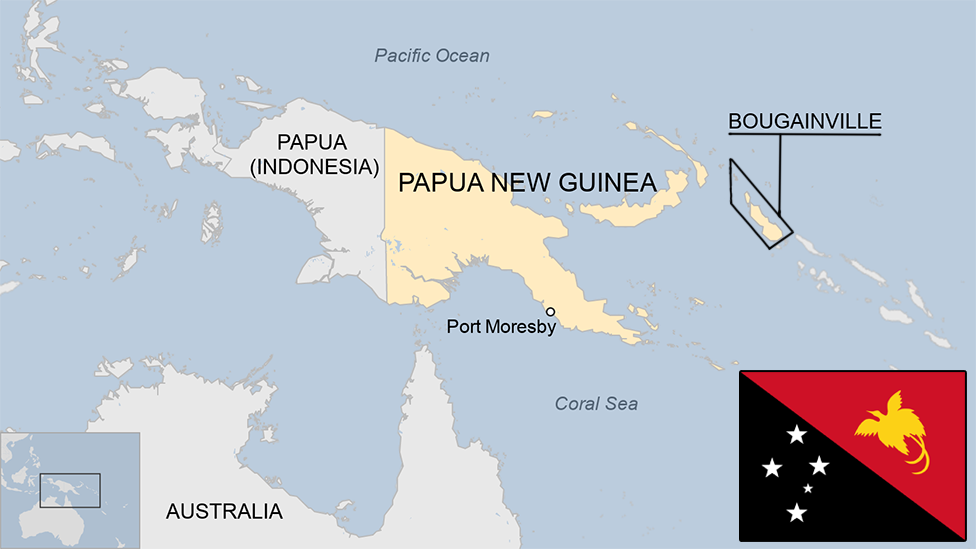Manus Island: Australia's Guantanamo?
- Published
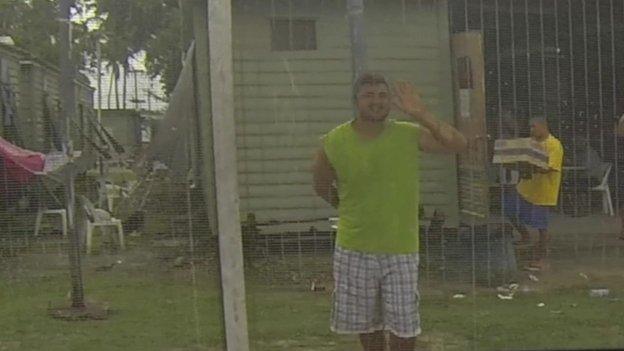
Around a thousand asylum seekers are locked up on Manus Island
Head to Australia by boat. End up in a place like Papua New Guinea.
That in essence is the message at the heart of Australia's asylum seeker policy.
You might be seeking a new life in one of the world's richest countries but you'll wash up in one of the world's poorest.
Papua New Guinea's Manus Island is a place Australia does not want the world to see.
Dubbed by some "the Guantanamo of the Pacific", it is home to one of Australia's off-shore detention centres, where around a thousand asylum seekers are locked up.
It is extremely difficult for journalists to get visas to go there. So we travelled undercover, posing as tourists.
We managed to smuggle our camera past Australian officials and reach the camp.
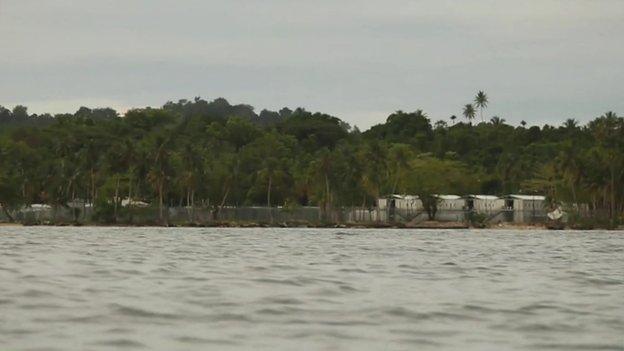
The BBC travelled under cover to Manus Island as it is hard for journalists to gain access
We found asylum seekers, their faces pressed against the fences, some of whom have been stuck in Manus for almost two years.
Many have fled the misery of the world's war zones - such as Syria, Iraq and Afghanistan - but now find themselves imprisoned, seemingly indefinitely.
Riots
Manus Island is far from the Promised Land.
Over the past year the detention centre has been at boiling point.
There have been riots in which one Iranian asylum seeker was killed.
Hundreds have been on hunger strike.
Some even stitched their lips together in protest.
One man reportedly swallowed razor blades in desperation.
People on Manus are scared to talk.
But we managed to speak to one Middle Eastern man, Ahmed (not his real name), who spent 18 months locked up inside the detention centre before being moved to a more open prison on Manus.
"My situation in detention was very, very, very terrible," Ahmed told us.
"We were living in one room two metres squared, four people. It's unfair.
"The Australian government broke the majority of our human rights. They don't have any plan for us."
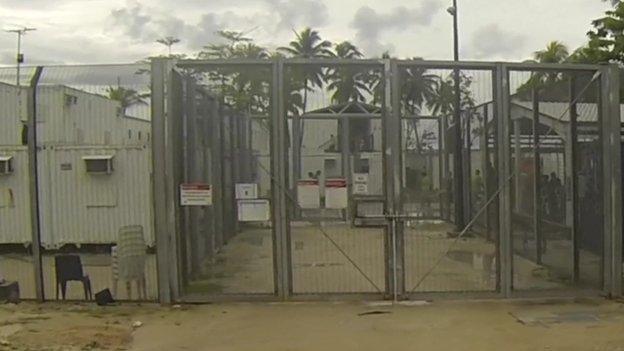
Ahmed described his situation in detention as "terrible"
Ahmed told me he fled his home country, having tried to expose corruption inside the business where he was working.
He also said he has publicly renounced Islam, something which could see him facing the death penalty back home.
"They will kill me if I go back," Ahmed said.
He left his family behind but says he had no option.
"I have just one sister and I really love her. I love my parents and it is very hard to tolerate this situation without my family. But I don't have any choice.
"I am trying to start my life - my real life."
Ahmed is one of around two dozen asylum seekers who have agreed to be resettled on Manus Island as a refugee.
It meant he was able to leave the detention centre, but his situation has only marginally improved.
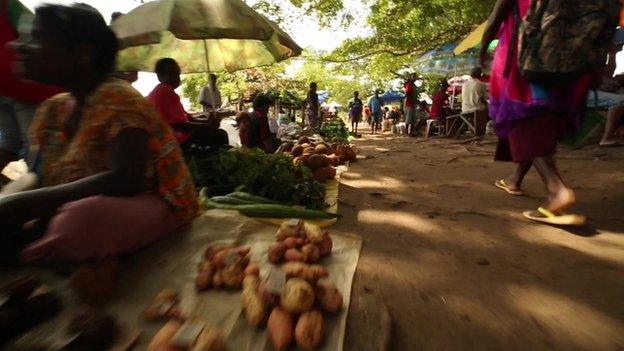
Australia is paying aid to PNG in return for resettling refugees there
He now lives in a heavily guarded "resettlement centre."
Ahmed is allowed out and about in the day time; many of the refugees can be seen jogging or cycling along the roadside to pass the time.
But he is not allowed to work, and he has to stick to a strict curfew between 6pm and 6am.
Skills
Like many of the asylum seekers he is well educated, with a degree and a professional qualification.
"There are doctors, teachers, engineers, carpet makers. They are intelligent people. We could use their skills," one of the security guards on Manus told us.
He didn't want to give his name for fear of losing his job.
"I feel sorry for them. They're human beings. They want their freedom."
But to get that freedom, they might have to agree to make Papua New Guinea their home.
Deterrence
In 2013, under the Labor government of Kevin Rudd, Australia did a deal with PNG, agreeing to pay the impoverished Pacific nation around AU$400m (US$300m; £200m) in aid if it agreed not only to house the detention centre but also to resettle refugees.
The message was clear: asylum seekers trying to reach Australia's shores by boat, no matter how desperate, would not be resettled there.
The Australian government defended the decision, saying the aim was deterrence, to stop desperate asylum seekers drowning at sea.
It worked.
Up until 2013 thousands of asylum seekers were trying to make the perilous journey to Australia by boat.
Hundreds died in the process.
Two years later, the number attempting the journey has been reduced to virtually zero.
Australia's navy has engaged in a policy of forcibly turning boats back.
And now the Prime Minister Tony Abbott has refused to deny reports that Australian officials had even resorted to paying people smugglers tens of thousands of dollars to abort their journeys.
Some might say that's a bit like paying a bank robber, not to rob banks.
But Mr Abbott said his government was using all manner of "creative strategies" to stop the boats, including methods that he described as "by hook or by crook."
'Boomerang aid'
On Manus Island reaction to Australia's policies is mixed.
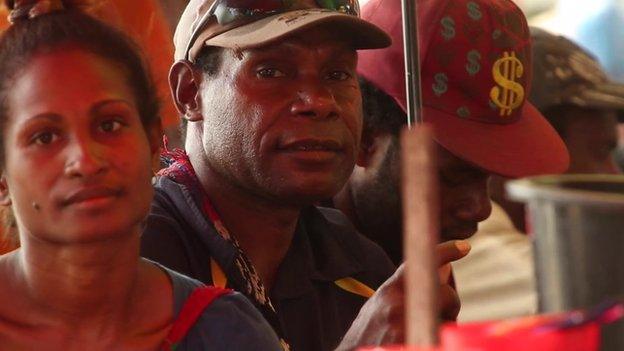
Papua New Guinea is a poor country
On the one hand the detention centre has provided hundreds of jobs for local people who work as security guards.
But in terms of the AU$400m of aid promised for Papua New Guinea as part of the deal, many local people say they've seen little of that money.
"It is like boomerang aid," says Nahau Rooney, a community leader on Manus.
"They bring the money but Manus is getting maybe 1%, maybe 10%. But most of the major contracts are going to Australian companies."
Australia's so-called Pacific solution has worked and is probably supported by the majority of Australians.
It has stopped the boats.
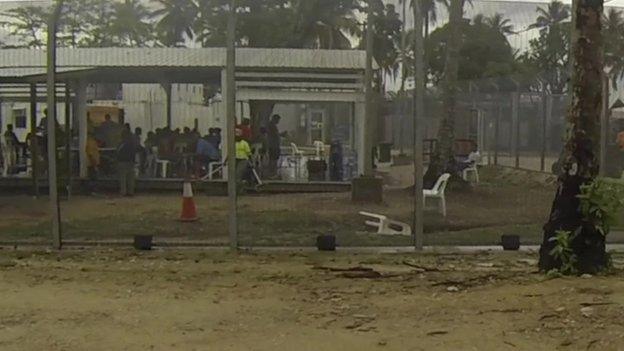
Reputation
Tony Abbott has said Europe should be following Australia's example in tackling the migrant crisis in the Mediterranean.
But the problem Europe is facing and the numbers involved are on a far, far greater scale.
And Australia's policies have come at a cost to the country's reputation as a welcoming nation.
Human rights groups have branded Australia's methods cruel and inhumane.
The United Nations even said the treatment inside places like Manus Island was tantamount to torture.
For the thousand or so asylum seekers stuck on Manus their future is bleak.
They are the world's unwanted.
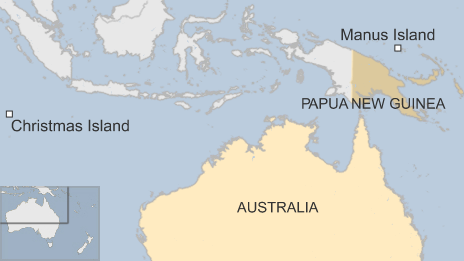

Australia and asylum
Asylum seekers - mainly from Afghanistan, Sri Lanka, Iraq and Iran - travel to Australia's Christmas Island by boat from Indonesia
The number of boats rose sharply in 2012 and early 2013. Scores of people have died making the journey
To stop the influx, the government has adopted hard-line measures intended as a deterrent
Everyone who arrives is detained. Under a new policy, they are processed in Nauru and Papua New Guinea. Those found to be refugees will be resettled in PNG, Nauru or Cambodia
Tony Abbot's government has also adopted a policy of tow-backs, or turning boats around
Rights groups and the UN have voiced serious concerns about the policies and accuse Australia of shirking international obligations

- Published12 June 2015
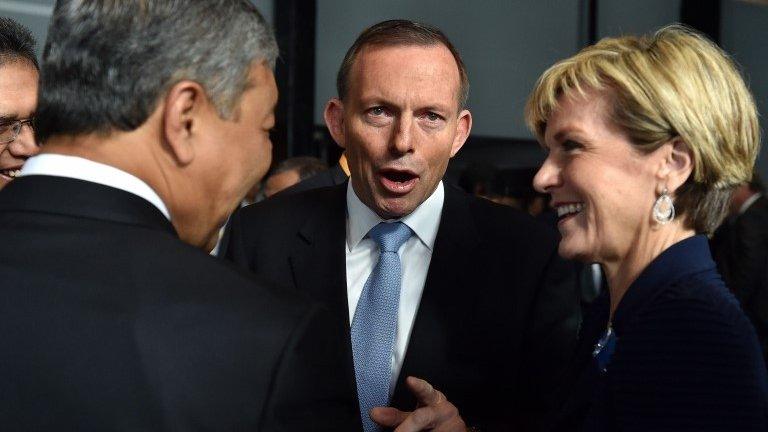
- Published31 October 2017
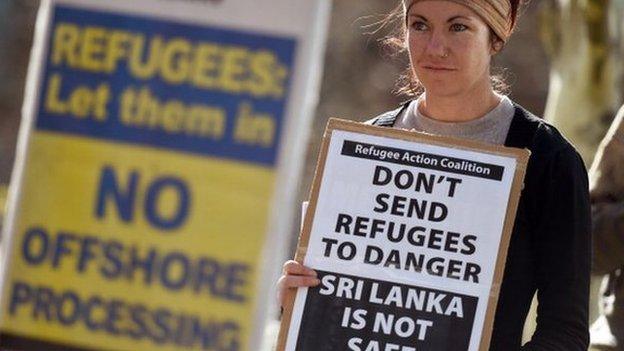
- Published27 May 2015
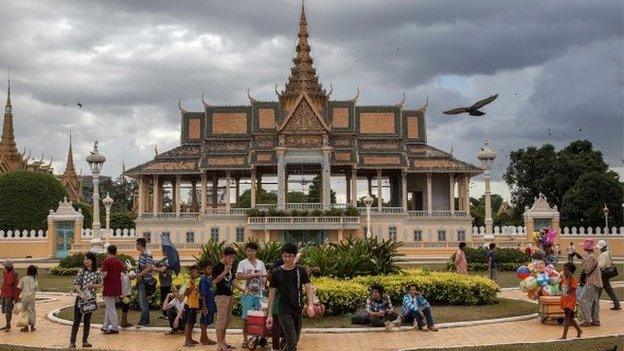
- Published18 February 2015
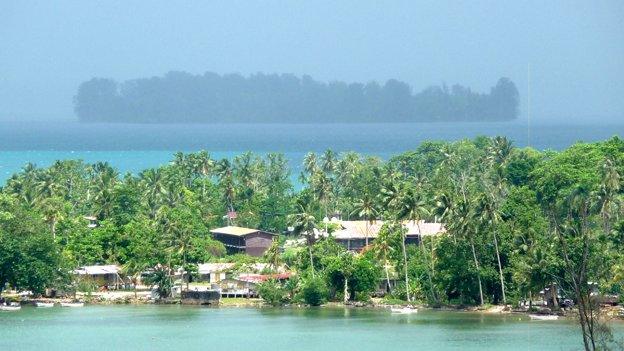
- Published19 December 2023
